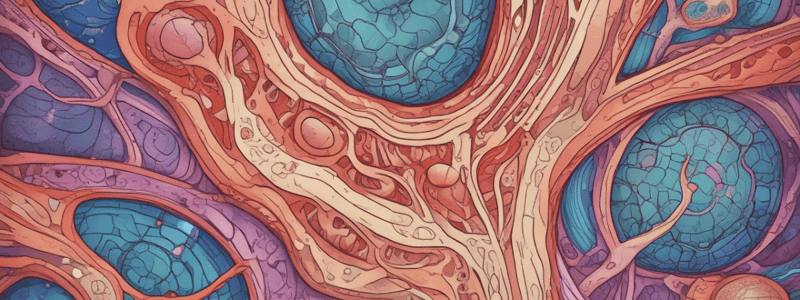Podcast
Questions and Answers
What is the origin of Merkel cells?
What is the origin of Merkel cells?
- Hypodermis
- Dermis
- Neural crest (correct)
- Epidermis
What is the function of Merkel cells?
What is the function of Merkel cells?
- Sweat production
- Wound healing
- Mechanoreceptors (correct)
- Secretion of sebum
What is the location of eccrine sweat glands?
What is the location of eccrine sweat glands?
- Present all over the body, most numerous in the palms and soles (correct)
- Only in the dermis
- Only in the hypodermis
- Only in the axilla and pubic regions
What is unique about the secretory part of apocrine sweat glands?
What is unique about the secretory part of apocrine sweat glands?
What is the function of sebum secretion by sebaceous glands?
What is the function of sebum secretion by sebaceous glands?
In which layer of the skin is the dermis located?
In which layer of the skin is the dermis located?
What type of epithelium is the epidermis?
What type of epithelium is the epidermis?
What is the main function of melanocytes in the epidermis?
What is the main function of melanocytes in the epidermis?
What is the name of the layer of the epidermis where mitosis is common?
What is the name of the layer of the epidermis where mitosis is common?
What is the function of Langerhans cells in the epidermis?
What is the function of Langerhans cells in the epidermis?
What is the name of the enzyme necessary for melanin synthesis?
What is the name of the enzyme necessary for melanin synthesis?
What is the name of the layer of the epidermis composed of dead, scale-like cells?
What is the name of the layer of the epidermis composed of dead, scale-like cells?
What is the location of melanocytes in the epidermis?
What is the location of melanocytes in the epidermis?
What is the name of the organelles where melanin synthesis occurs?
What is the name of the organelles where melanin synthesis occurs?
Flashcards are hidden until you start studying
Study Notes
Skin Structure
- The skin consists of two main layers: the epidermis (superficial epithelial layer) and the dermis (deep underlying connective tissue layer)
- The skin rests on the hypodermis, a connective tissue rich in adipose tissue
Cells of Epidermis
- Keratinocytes: most abundant type, found in the epidermis
- Melanocytes: found scattered in the stratum basale, produce melanin pigment
- Langerhans cells: found in the stratum spinosum, have a role in immune response
- Merkels cells: found among keratinocytes in the stratum basale, function as mechanoreceptors
Layers of Epidermis
- Stratum germinativum (basal layer): single layer of cuboidal to columnar cells, rests on basement membrane
- Stratum spinosum (prickle cell layer): several layers of polyhedral cells
- Stratum granulosum: 3-5 layers of cells that become flattened as they are pushed upward, accumulate granules of two types
- Stratum lucidum (clear layer): 3-5 layers of flattened cells
- Stratum corneum (cornified layer): dead, scale-like cells
Melanocytes
- Produce melanin pigment, which is transferred to adjacent keratinocytes
- Melanin synthesis depends on the presence of tyrosinase enzyme located in melanosomes, formed in the RER and packed in Golgi
Langerhans Cells
- Located in the stratum spinosum, contain specific rod-like inclusions called Birbeck granules
- Function as antigen-presenting cells, phagocytose foreign antigens, process and present them on their surface to T-lymphocytes
Merkel Cells
- Originate from the neural crest, located among keratinocytes in the stratum basale
- Function as mechanoreceptors, associated with unmyelinated sensory nerve fibers
Dermis
- Consists of two layers: an outer papillary layer and an inner reticular layer containing thick collagen bundles
- Most of the nerve supply and all the vascular supply is found in the dermis and hypodermis
Sweat Glands
- Eccrine glands: simple coiled tubular glands, found all over the body, most numerous in the palms and soles
- Apocrine glands: simple coiled tubular glands, found in the axilla and pubic regions
Sebum Production
- Sebum is secreted by sebaceous glands, which open into the upper part of the hair follicle
- Sebum has bacteriostatic, fungistatic properties, and softens the stratum corneum
Studying That Suits You
Use AI to generate personalized quizzes and flashcards to suit your learning preferences.




